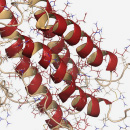U.S. License Holder:
Merck Sharp Dohme
Date of License:
September-04-2014
Last Update:
Feb-23-2026
 FDA-Approved Indications
FDA-Approved Indications
KEYTRUDA (pembrolizumab) is a programmed death receptor-1 (PD-1)-blocking antibody indicated:
Melanoma: for the treatment of patients with unresectable or metastatic melanoma; for the adjuvant treatment of adult and pediatric (12 years and older) patients with Stage IIB, IIC, or III melanoma following complete resection;
Non-Small Cell Lung Cancer (NSCLC): in combination with pemetrexed and platinum chemotherapy, as first-line treatment of patients with metastatic nonsquamous NSCLC, with no EGFR or ALK genomic tumor aberrations; in combination with carboplatin and either paclitaxel or paclitaxel protein-bound, as first-line treatment of patients with metastatic squamous NSCLC; as a single agent for the first-line treatment of patients with NSCLC expressing PD-L1 [Tumor Proportion Score (TPS) greater than or equal to 1 percent] as determined by an FDA-authorized test, with no EGFR or ALK genomic tumor aberations, and is: Stage III where patients are not candidates for surgical resection or definitive chemoradiation, or metastatic; as a single agent for the treatment of patients with metastatic NSCLC whose tumors express PD-L1 (TPS greater than or equal to 1 percent) as determined by an FDA-authorized test, with disease progression on or after platinum-containing chemotherapy. Patients with EGFR or ALK genomic tumor aberrations should have disease progression on FDA-authorized therapy for these aberrations prior to receiving Keytruda; for the treatment of patients with resectable (tumors greater than or equal to 4 cm or node positive) NSCLC in combination with platinum-containing chemotherapy as neoadjuvant treatment, and then continued as a single agent as adjuvant treatment after surgery; as a single agent, for adjuvant treatment following resection and platinum-based chemotherapy for adult patients with Stage IB (T2a greater than or equal to 4 cm), II, or IIIA NSCLC;
Malignant Pleural Mesothelioma (MPM): in combination with pemetrexed and platinum chemotherapy, as first-line treatment of adult patients with unresectable advanced or metastatic MPM;
Head and Neck Squamous Cell Cancer (HNSCC): For the treatment of adult patients with resectable locally advanced HNSCC whose tumors express PD-L1 [Combined Positive Score (CPS) greater than or equal to 1] as determined by an FDA-authorized test, as a single agent as neoadjuvant treatment, continued as adjuvant treatment in combination with radiotherapy (RT) with or without cisplatin and then as a single agent; In combination with platinum and FU for the first-line treatment of patients with metastatic or with unresectable, recurrent HNSCC; As a single agent for the first-line treatment of patients with metastatic or with unresectable, recurrent HNSCC whose tumors express PD-L1 [Combined Positive Score (CPS) greater than or equal to 1] as determined by an FDA-authorized test; As a single agent for the treatment of patients with recurrent or metastatic HNSCC with disease progression on or after platinum-containing chemotherapy;
Classical Hodgkin Lymphoma (cHL): for the treatment of adult patients with relapsed or refractory cHL; for the treatment of pediatric patients with refractory cHL, or cHL that has relapsed after 2 or more lines of therapy;
Primary Mediastinal Large B-Cell Lymphoma (PMBCL): for the treatment of adult and pediatric patients with refractory PMBCL, or who have relapsed after 2 or more prior lines of therapy;
Urothelial Cancer: in combination with enfortumab vedotin, for the treatment of adult patients with locally advanced or metastatic urothelial cancer; as a single agent for the treatment of patients with locally advanced or metastatic urothelial carcinoma who: are not eligible for any platinum-containing chemotherapy, or who have disease progression during or following platinum-containing chemotherapy or within 12 months of neoadjuvant treatment with platinum-containing chemotherapy; in combination with enfortumab vedotin, as neoadjuvant treatment and then continued after cystectomy as adjuvant treatment of adult patients with muscle invasive bladder cancer (MIBC) who are ineligible for cisplatin-containing chemotherapy; as a single agent for the treatment of patients with Bacillus Calmette-Guerin (BCG)-unresponsive, high-risk, non-muscle invasive bladder cancer (NMIBC) with carcinoma in situ (CIS) with or without papillary tumors who are ineligible for or have elected not to undergo cystectomy;
Microsatellite Instability-High or Mismatch Repair Deficient Cancer: for the treatment of adult and pediatric patients with unresectable or metastatic, microsatellite instability-high (MSI-H) or mismatch repair deficient (dMMR) solid tumors, as determined by an FDA-authorized test, that have progressed following prior treatment and who have no satisfactory alternative treatment options;
Microsatellite Instability-High or Mismatch Repair Deficient Colorectal Cancer (CRC): for the first-line treatment of patients with unresectable or metastatic MSI-H or dMMR colorectal cancer (CRC) as determined by an FDA-authorized test;
Gastric Cancer: in combination with trastuzumab, fluoropyrimidine- and platinum-containing chemotherapy, for the first-line treatment of adults with locally advanced unresectable or metastatic HER2-positive gastric or gastroesophageal junction (GEJ) adenocarcinoma whose tumors express PD-L1 (CPS greater than or equal to 1) as determined by an FDA-authorized test; In combination with fluoropyrimidine- and platinum-containing chemotherapy, for the first-line treatment of adults with locally advanced unresectable or metastatic HER2-negative gastric or gastroesophageal junction (GEJ) adenocarcinoma whose tumors express PD-L1 (CPS greater than or equal to 1) as determined by an FDA authorized test;
Esophageal Cancer: for the treatment of patients with locally advanced or metastatic esophageal or gastroesophageal junction (GEJ) (tumors with epicenter 1 to 5 centimeters above the GEJ) carcinoma that is not amenable to surgical resection or definitive chemoradiation either: in combination with platinum- and fluoropyrimidine-based chemotherapy, for patients whose tumors express PD-L1 (CPS greater than or equal to 1), or s a single agent after one or more prior lines of systemic therapy for patients with tumors of squamous cell histology that express PD-L1 (CPS greater than or equal to 10) as determined by an FDA-authorized test;
Cervical Cancer: In combination with chemoradiotherapy, for the treatment of patients with locally advanced cervical cancer involving the lower third of the vagina, with or without extension to pelvic sidewall, or hydronephrosis/nonofunctioning kidney, or spread to adjacent pelvic organs (FIGO 2014 Stage III-IVA); in combination with chemotherapy, with or without bevacizumab, for the treatment of patients with persistent, recurrent or metastatic cervical cancer whose tumors express PD-L1 (CPS greater than or equal to 1) as determined by an FDA-authorized test; as a single agent for the treatment of patients with recurrent or metastaticcervical cancer with disease progression on or after chemotherapy whose tumors express PD-L1 (CPS greater than or equal to 1) as determined by an FDA-authorized test;
Hepatocellular Carcinoma (HCC): for the treatment of patients with HCC secondary to hepatitis B who have received prior systemic therapy other than a PD-1/PD-L1-containing regimen;
Biliary Tract Cancer (BTC): In combination with gemcitabine and cisplatin, for the treatment of patients with locally advanced unresectable or metastatic biliary tract cancer;
Merkel Cell Carcinoma (MCC): for the treatment of adult and pediatric patients with recurrent locally advanced or metastatic Merkel cell carcinoma;
Renal Cell Carcinoma (RCC): In combination with axitinib, for the first-line treatment of adult patients with advanced RCC; In combination with lenvatinib, for the first-line treatment of adult patients with advanced RCC; For the adjuvant treatment of patients with RCC at intermediate-high or high risk of recurrence following nephrectomy, or following nephrectomy and resection of metastatic lesions;
Endometrial Carcinoma: In combination with carboplatin and paclitaxel, followed by KEYTRUDA as a single agent, for the treatment of adult patients with primary advanced or recurrent endometrial carcinoma; In combination with lenvatinib, for the treatment of patients with advanced endometrial carcinoma that is mismatch repair proficient (pMMR) or not MSI-H as determined by an FDA-authorized test, who have disease progression following prior systemic therapy in any setting and are not candidates for curative surgery or radiation; As a single agent, for the treatment of patients with advanced endometrial carcinoma that is MSI-H or dMMR, as determined by an FDA-authorized test, who have disease progression following prior systemic therapy in any setting and are not candidates for curative surgery or radiation;
Tumor Mutational Burden-High (™B-H) Cancer: For the treatment of adult and pediatric patients with unresectable or metastatic tumor mutational burden-high (™B-H) [greater than or equal to 10 mutations/megabase (mut/Mb)] solid tumors, as determined by an FDA-authorized test, that have progressed following prior treatment and who have no satisfactory alternative treatment options;
Cutaneous Squamous Cell Carcinoma (cSCC): For the treatment of patients with recurrent or metastatic cSCC or locally advanced cSCC that is not curable by surgery or radiation.
Triple-Negative Breast Cancer (TNBC): For the treatment of patients with high-risk early-stage TNBC in combination with chemotherapy as neoadjuvant treatment, and then continued as a single agent as adjuvant treatment after surgery; In combination with chemotherapy, for the treatment of patients with locally recurrent unresectable or metastatic TNBC whose tumors express PD-L1 (CPS greater than or equal to 10) as determined by an FDA authorized test;
Ovarian Cancer: in combination with paclitaxel, with or without bevacizumab, for the treatment of adult patients with platinum-resistant epithelial ovarian, fallopian tube, or primary peritoneal carcinoma whose tumors express PD-L1 (CPS greater than or equal to 1) as determined by an FDA authorized test, and who have received one or two prior systemic treatment regimens.








